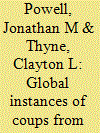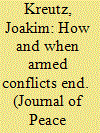| Srl | Item |
| 1 |
ID:
103724


|
|
|
|
|
| Publication |
2011.
|
| Summary/Abstract |
Once considered a 'hot topic' among scholars, research on coups d'état has waned in recent years. This decline is surprising given that 7 coups have happened between January 2008 and December 2010, bringing the last decade's total to almost three dozen. One explanation for the lack of coup research is the absence of a temporally and spatially comprehensive dataset to test theories. Also absent is a discussion of what makes coups distinct from other forms of anti-regime activity. This article seeks to remedy these problems. The authors present a new dataset on coups from 1950 to 2010. They begin by explaining their theoretical definition and coding procedures. Next, they examine general trends in the data across time and space. The authors conclude by explaining why scholars studying a variety of topics, including civil wars, regime stability, and democratization, would benefit by paying closer attention to coups.
|
|
|
|
|
|
|
|
|
|
|
|
|
|
|
|
| 2 |
ID:
094704


|
|
|
|
|
| Publication |
2010.
|
| Summary/Abstract |
This article presents new data on the start and end dates and the means of termination for armed conflicts, 1946-2005. These data contribute to quantitative research on conflict resolution and recurrence in three important respects: the data cover both interstate and intrastate armed conflicts, the data cover low-intensity conflicts, and the data provide information on a broad range of termination outcomes. In order to disaggregate the UCDP-PRIO Armed Conflict dataset into multiple analytical units, this dataset introduces the concept of conflict episodes, defined as years of continuous use of armed force in a conflict. Using these data, general trends and patterns are presented, showing that conflicts do not exclusively end with decisive outcomes such as victory or peace agreement but more often under unclear circumstances where fighting simply ceases. This pattern is consistent across different types of conflict, as is the finding that victories are more common in conflicts with short duration. The article then examines some factors that have been found to predict civil war recurrence and explores whether using the new dataset produces similar results. This exercise offers a number of interesting new insights and finds that the determinants for civil war recurrence identified in previous research are sensitive to alternate formulations of conflict termination data. The findings suggest that intrastate conflicts are less likely to recur after government victories or after the deployment of peacekeepers. If the previous conflict is fought with rebels aiming for total control over government or if the belligerents mobilized along ethnic lines, the risk of recurrence increases. The discrepancy in findings with previous research indicates the need for further study of conflict resolution and recurrence, for which this dataset will be useful.
|
|
|
|
|
|
|
|
|
|
|
|
|
|
|
|